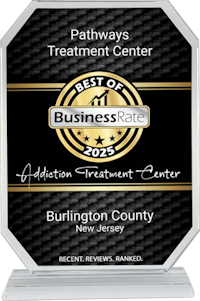Inhalant Addiction Treatment in Burlington, New Jersey
Inhalant abuse is serious and dangerous. At Pathways, we provide targeted treatment for inhalant addiction through therapy, medical oversight, and recovery planning to help you break free and reclaim your health.
At Pathways Treatment Center, our goal is to address substance abuse cases and the unique challenges posed by inhalant abuse through our addiction treatment programs. If you are affected by inhalant abuse, Pathways Treatment Center can help you or your loved ones find a path to recovery.
Inhalant Addiction Treatment in New Jersey
What are Inhalants?
Inhalants are substances that people typically inhale to achieve a quick and intense high. Unlike other drugs that are ingested or injected, inhalants are breathed in through the nose or mouth. The term ‘inhalants’ covers a variety of substances, including household products.
When it comes to the types of substances that are used as inhalants, many chemicals found in household and work-related products have the potential to be abused. These chemicals, when inhaled, are absorbed into the bloodstream and act rapidly. The user then experiences psychoactive effects of the chemicals that some people, unfortunately, find pleasurable.
Slang terms for inhalants include “huff” and “rush,” with one popular form referred to as “whippets.” These names often make the substances sound harmless, but the reality is far from it. Inhalant abuse is a serious issue which puts individuals at risk for health challenges associated with addiction and the abuse of dangerous chemicals.
Inhalant Addiction Treatment in New Jersey
How are Inhalants Classified?
The different categories of inhalants can be broadly classified into three categories: aerosols, solvents, and gasses. Each category has its own set of characteristics and risks.
There are several types of inhalants, which include the following:
- Aerosols are sprays that contain propellants and solvents. Common examples include deodorant sprays, hair sprays, and cooking sprays. These products contain chemicals that can cause significant harm when inhaled.
- Solvents are liquid substances that can dissolve other materials. They are found in products like glue, paint thinners, and correction fluids. Solvents are particularly dangerous because many are highly toxic and can cause severe damage to the brain and other organs.
- Gasses include medical anesthesia, as well as gasses used in household and industrial products (such as butane and propane). These can cause heart failure and other serious health issues.
Understanding these categories helps in recognizing the wide range of products that can be misused as inhalants.
Inhalant Addiction Treatment in New Jersey
Signs of Inhalant Addiction
 Identifying inhalant addiction can be challenging, due to the variety of substances involved. Over 1,000 different chemicals have been found to be used in cases of inhalant abuse. However, certain signs and symptoms can indicate a problem with inhalant abuse.
Identifying inhalant addiction can be challenging, due to the variety of substances involved. Over 1,000 different chemicals have been found to be used in cases of inhalant abuse. However, certain signs and symptoms can indicate a problem with inhalant abuse.
The following signs may be present in someone who is abusing inhalants:
- Physical Symptoms include a red or runny nose, sores around the mouth, chemical odors on breath or clothing, and frequent nosebleeds.
- Behavioral Changes such as sudden mood swings, irritability, and a noticeable decline in academic or work performance.
- Paraphernalia like empty aerosol cans, rags soaked with chemicals, and plastic bags hidden in unusual places.
Recognizing these signs early can make a significant difference in seeking timely treatment. If you are concerned about a loved one who may be using inhalants, an inhalant addiction treatment program may be necessary. Through comprehensive treatment, those in the grip of addiction can move on from inhalant abuse and build a happy and productive life.
Inhalant Addiction Treatment in New Jersey
The Short-term Effects of Inhalant Addiction
Inhalant addiction, like all other forms of addiction, comes with both short and long-term effects. Unfortunately, for some, the immediate effects of inhalant use can be both enticing and dangerous. When abusing inhalants, users may experience the following short-term effects:
- Euphoria
- Dizziness
- Slurred speech
- Lack of coordination
- Hallucinations
These short-term effects can escalate quickly, leading to risky behaviors and immediate health concerns. Due to the fact that inhalants are largely chemicals, their misuse over time can cause very severe health problems.
Inhalant Addiction Treatment in New Jersey
The Long-term Effects of Inhalant Addiction
Long-term inhalant abuse can cause severe and lasting damage to the body and mind. Some of the most serious long-term effects include the following:
- Brain damage: This leads to cognitive impairments and memory loss.
- Liver and kidney damage: This is due to the toxic nature of many inhalants.
- Respiratory issues: These may include chronic bronchitis and damaged airways.
- Heart problems: This may include irregular heartbeats and increased risk of heart attacks.
- Mental health issues: People with inhalant addiction may suffer with depression, anxiety, and other emotional disorders. This necessitates dual diagnosis treatment to achieve recovery that lasts, so the mental illness is taken into account.
The damage caused by long-term inhalant use can be irreversible, making early intervention crucial. By seeking addiction treatment or noticing the signs of inhalants addiction early, you or a loved one can avoid serious harm caused by inhaling dangerous chemicals.
Inhalant Addiction Treatment in New Jersey
Who is at Risk for Inhalant Addiction?
Inhalant abuse spans a variety of ages and socioeconomic levels. However, young people are especially vulnerable to developing an inhalant addiction. This is partly due to the fact that objects containing inhalants are much more accessible to young people than alcohol or illegal substances. According to the National Institute on Drug Abuse Statistics, a large majority of people who engage in inhalant abuse are teenagers, with the age range of 14-15 being a common age for abuse.
Inhalant abuse is also common among young adults, especially those who enjoy nightlife and partying. Inhalants known as “poppers” have a history of popularity among young men, particularly those in the LGBTQ+ community. But inhalant abuse in general is seen throughout a diverse range of populations.
Inhalant Addiction Treatment in New Jersey
Can I Overdose on Inhalants?
 Yes, overdosing on inhalants is not only possible but also potentially fatal. Signs of an inhalant overdose include:
Yes, overdosing on inhalants is not only possible but also potentially fatal. Signs of an inhalant overdose include:
- Severe headaches and intense dizziness.
- Confusion and disorientation.
- Loss of consciousness, which can lead to coma.
- Irregular heartbeat or palpitations.
- Chest pain, indicating possible heart issues.
An overdose requires immediate medical attention to prevent permanent damage or death. If you suspect that someone close to you is overdosing on inhalants, contacting emergency services can help prevent death.
The best way to avoid an overdose is to avoid using inhalants entirely. However, this may be difficult once an individual is addicted. During active addiction, individuals who abuse inhalants may find themselves unable to stop inhalant abuse. This is a clear sign of addiction that transcends different substances.
Inhalant Addiction Treatment in New Jersey
Do Inhalants Cause Withdrawal?
Withdrawal from inhalants is challenging and can be both physically and mentally taxing. Symptoms of inhalant withdrawal may include:
- Nausea and vomiting
- Sweating and shaking, similar to symptoms of anxiety or panic attacks.
- Agitation and irritability
- Insomnia
- Cravings
Withdrawal is often a significant barrier to quitting. As previously mentioned, many people find themselves unable to quit abusing substances due to the onset of uncomfortable withdrawal symptoms. Professional help and medication-assisted treatment (MAT) can make the process more manageable.
Inhalant Addiction Treatment in New Jersey
Do Inhalants Cause Withdrawal?
Withdrawal from inhalants is challenging and can be both physically and mentally taxing. Symptoms of inhalant withdrawal may include:
- Nausea and vomiting
- Sweating and shaking, similar to symptoms of anxiety or panic attacks.
- Agitation and irritability
- Insomnia
- Cravings
Withdrawal is often a significant barrier to quitting. As previously mentioned, many people find themselves unable to quit abusing substances due to the onset of uncomfortable withdrawal symptoms. Professional help and medication-assisted treatment (MAT) can make the process more manageable.
Inhalant Addiction Treatment in New Jersey
Heal from Inhalant Addiction at Pathways
At Pathways Treatment Center, we understand that each individual’s path to recovery is unique. Our sanctuary in Burlington, New Jersey offers personalized recovery programs designed to help you overcome inhalant addiction and build a sustainable, sober life. Our dedicated team of experts is here to support you every step of the way.
If you or a loved one is struggling with inhalant addiction, don’t wait. Contact us today at Pathways Treatment Center to learn more about our inhalant addiction treatment programs and take the first step towards a brighter future.



